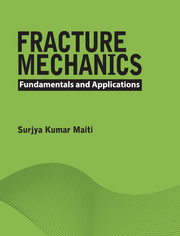Description
Fracture Mechanics
Fundamentals and Applications
Author: Maiti Surjya Kumar
Language: English
Subject for Fracture Mechanics:
Approximative price 63.74 €
In Print (Delivery period: 14 days).
Add to cart
Publication date: 10-2015
295 p. · 18.7x24.8 cm · Hardback
295 p. · 18.7x24.8 cm · Hardback
Description
/li>Contents
/li>Biography
/li>
Fracture mechanics studies the development and spreading of cracks in materials. The study uses two techniques including analytical and experimental solid mechanics. The former is used to determine the driving force on a crack and the latter is used to measure material's resistance to fracture. The text begins with a detailed discussion of fundamental concepts including linear elastic fracture mechanics (LEFM), yielding fracture mechanics, mixed mode fracture and computational aspects of linear elastic fracture mechanics. It explains important topics including Griffith theory of brittle crack propagation and its Irwin and Orowan modification, calculation of theoretical cohesive strength of materials through an atomic model and analytical determination of crack tip stress field. This book covers MATLAB programs for calculating fatigue life under variable amplitude cyclic loading. The experimental measurements of fracture toughness parameters KIC, JIC and crack opening displacement (COD) are provided in the last chapter.
List of figures; List of tables; Preface; 1. Introduction; 2. Linear elastic fracture mechanics; 3. Determination of crack-tip stress field; 4. Crack opening displacement, J integral, and resistive curve; 5. Determination of stress intensity factors; 6. Mixed mode brittle fracture; 7. Fatigue crack growth; 8. Elastic plastic fracture mechanics; 9. Experimental measurements of fracture toughness data; References; Index.
Surjya Kumar Maiti is a Professor in the Department of Mechanical Engineering, Indian Institute of Technology, Bombay. He has more than thirty-five years of teaching and research experience and has published nearly 100 papers in national and international journals. He received his PhD from the Indian Institute of Technology, Bombay, and worked as postdoctoral assistant at the University of Cambridge for two years (1981–1983). He has taught courses on solid mechanics, strength of materials, stress analysis and pressure vessel design at both the undergraduate and postgraduate levels. His areas of research include fracture mechanics, finite element and boundary element methods, structural health monitoring and stress corrosion cracking.
© 2024 LAVOISIER S.A.S.
These books may interest you

Mechanics of Fatigue 74.82 €



